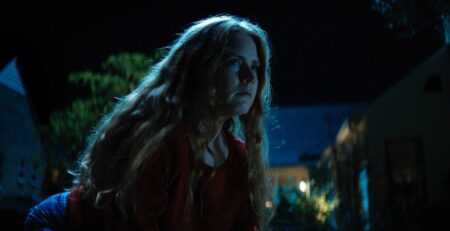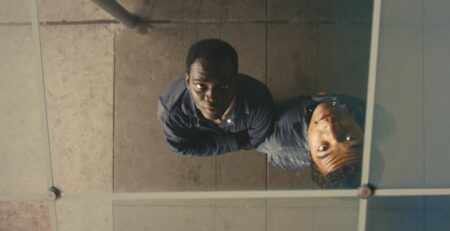Satire about difficult subjects works. Taking those difficult subjects and exploring how storytelling tropes bolster inequity through comedy is even more fruitful. To do this, you need to understand the trope and the direction in which you want to push it and make sure that choices don’t undercut an incisive critique. The American Society For Magical Negroes attempts to skewer the “Magical Negro” but instead undercuts itself.
The film follows Aren (Justice Smith), a young Black artist who gets through life by acquiescing to the white people around him. He is recruited by the mysterious Roger (David Alan Grier) into a secret society of magical Black people who dedicate their lives to making white people’s lives easier. Protecting white fragility is paramount to the organization safeguarding the lives of Black Americans. Using white tears meters that tell them when a white person is about to get uncomfortable and then get racist, the society’s members comfort their respective people to save the Black people that their client may come into contact with.
Aren’s first task as a member of The American Society For Magical Negroes is to work at a tech company and help Jason (Drew Tarver), his client, get over whatever is making his white tears meter fill repeatedly. Director Kobi Libii‘s debut feature film, The American Society For Magical Negroes engages with the trope by putting it into a comedy structure with a little bit of romance. After Aren narrowly escapes tragedy for trying to help a white woman, he becomes a real-life Magical Negro and begins to view his life’s choices to make himself smaller for white people in a new context.
Placating white people is a survival mechanism. The film doesn’t lose sight of that. The American Society of Magical Negroes‘ core concept is to show how building up palatability as a shield isn’t protection. Most of this is handled with clever twists. Kobi Libii takes scary moments and morphs them into humorous ones. Some are done cleverly, and others just aren’t.
The moments of the film that work are when it drops the satire. When we see Aren and Lizzie (An-Li Bogan) dealing with racist microaggressions in the workplace at every level, they experience with their colleagues, bosses, and ultimately the company’s tech itself. The American Society For Magical Negroes is a better film when it directly confronts race through humor without trying to make it into something magical.
The film’s magic also fails because of how thinly built it is. Libii attempts to world-build throughout the film, beginning. We see classes taught by Aisha Hinds and antagonistic threats from the Society’s leader Dede (Nicole Byer) in order to keep everyone in line. Every person in the society uses a magic tethered to every other member. Despite all of this exposition, none of it has a cohesive structure.
By the last act, it exists as a backdrop. Add in that Aren’s identity exists solely in relation to white people, and you have to question if the film is purposefully making this call or falling victim to the trope it’s trying to engage with. Aren doesn’t have any friends or any context beyond his work for the Society and his client. While we know that Aren has a white mother, the film never investigates it. Neither is colorism, in general, for that matter. Leaving the racial commentary, only half approached.
All of that said, The American Society For Magical Negroes has a powerful message. Becoming palatable for white people slowly kills you. You pull off pieces of yourself every time you give in respectability until nothing is left. Justice Smith gives a vulnerable performance in the film’s final monologue. In one moment, he is hurt, angry, and sad. Every emotion shows itself, crafting the complexity of pushing back on being told to stay silent. It marks Aren’s growth throughout the film. Up until this moment, we see him hollowing himself out, but here, he’s working to make himself whole. It’s the film’s strongest moment and distills what it wants to say.

If the film had ended with Aren becoming unashamed of his Blackness and shirking respectability, the film could have succeeded. Up until that point, the film has been Aren’s story. Even with the romance, it wasn’t about Aren sacrificing anything for Lizzie. Instead, he recognizes that he deserves the chance at love, too. However, instead of making this a story about how a woman saves him, Aren saves himself. He makes a personal choice, and that has an impact.
Then, the film removes all of its teeth. It makes the decision to cut down every point it makes over its runtime. The American Society For Magical Negroes ends on a “but.” For the last 104 minutes, we have seen the overt racism and microaggressions that Black people, particularly Black men, face in the workplace and the world. However, the film undercuts that pain in its finale, which, while I wish I could spoil, I can’t in this review. This choice is even more frustrating because of the decision to cast a white-passing woman as the female lead. Her casting works to explore workplace racism, but in the film’s finale, it hurts. Any good The American Society For Magical Negroes is hollow in the end while also making every misstep stand out starker in contrast.
The American Society For Magical Negroes is not an insightful look at racism in America through satire. It’s a paper-thin world built to satirize a trope that becomes consumed by it. Whether purposeful or by oversight, the film’s choice to make its point by fictionalizing historical figures into members of the society and idols of the trope without presenting any alternatives makes anything it has to say empty.
Despite Aren finding himself and refusing to make white people comfortable, the film shows no other path forward. Essentially, it’s to be a part of society or die of a hate crime. Fighting back is never an option, even in the film’s finale. Satire without a message or pointed critique isn’t only bland but runs the risk of uplifting the very thing that it wants to break. Had the movie ended at the end of Aren’s monologue, it could have been passable. But instead, the film continues, cutting down any pillar it stood on in the process.
The American Society For Magical Negroes could have been something huge if it wasn’t for its final moment. The film could have been seen as a sharp critique of respectability politics. Instead, it’s an empty presentation of them. The film is filled with “could haves” that undercut the importance of its subject matter.
The American Society For Magical Negroes premiered at Sundance 2024 and is playing in theaters nationwide now .
The American Society For Magical Negroes
-
Rating - 4/104/10
TL;DR
The American Society For Magical Negroes could have been something huge if it wasn’t for its final moment. It could have been seen as a sharp critique of respectability politics, but instead, it’s an empty presentation of them.





